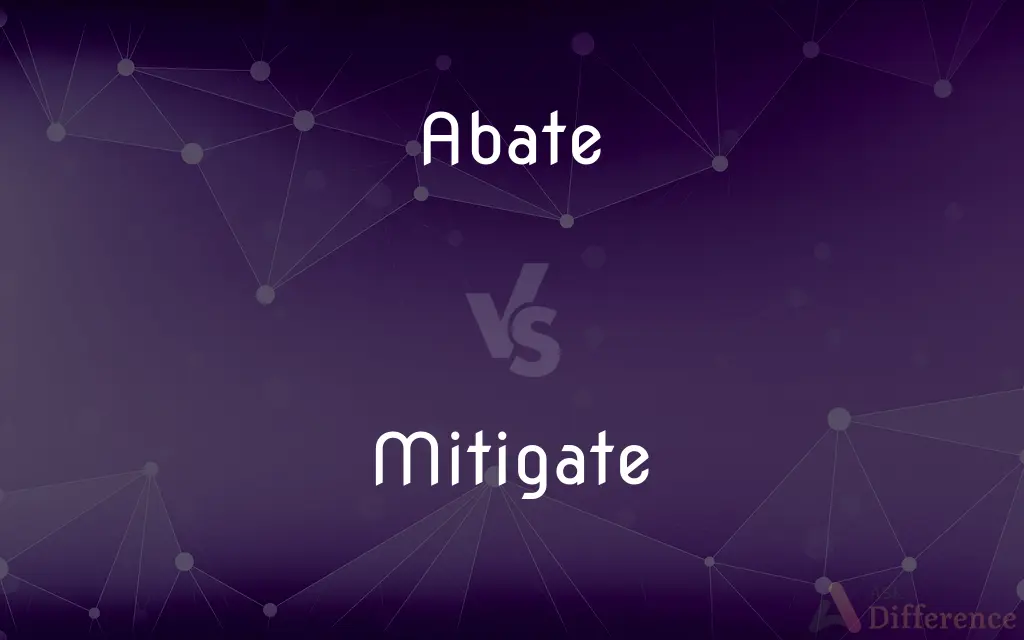Abate vs. Mitigate — What's the Difference?
By Fiza Rafique & Maham Liaqat — Updated on April 23, 2024
"Abate" refers to the reduction in intensity or amount of something, often quickly or completely, while "mitigate" involves making conditions less severe or harmful without necessarily eliminating them.

Difference Between Abate and Mitigate
Table of Contents
ADVERTISEMENT
Key Differences
Abate is primarily used when something diminishes in intensity, quantity, or force, suggesting a significant decrease or an end. Whereas, mitigate focuses on reducing the harshness, severity, or pain of something, but does not imply a complete cessation.
Environmental policies that aim to abate pollution seek to end it or significantly lower its levels. On the other hand, measures to mitigate climate change are intended to lessen the impacts rather than completely removing the threat.
In legal terms, to abate a nuisance means to remove or reduce it completely. Conversely, to mitigate damages means to minimize the financial impact without necessarily addressing the cause of the damage directly.
During natural disasters, emergency responses might aim to abate dangers such as flooding by completely removing water from affected areas. Meanwhile, efforts to mitigate disaster effects might focus on providing relief and reducing risk without eliminating the underlying threat.
Economic strategies can be designed to abate inflation by drastically reducing the money supply. In contrast, to mitigate economic downturns might involve implementing policies that soften the recession's impact without clearing the economic issues entirely.
ADVERTISEMENT
Comparison Chart
Definition
To reduce or eliminate completely
To make less severe or harmful
Scope
Often implies total cessation
Suggests reduction, not removal
Usage in Context
Environmental pollution, legal nuisances
Climate change, economic policies
Immediacy
Can be rapid or gradual
Usually gradual
Outcome
End result is often removal
End result is eased conditions
Compare with Definitions
Abate
Often refers to ending or reducing something undesirable.
The city took measures to abate the noise.
Mitigate
Implies management rather than resolution.
Techniques to mitigate pain were used during the procedure.
Abate
Also used in financial contexts, like reducing taxes.
The new policy will abate taxes for small businesses.
Mitigate
Common in discussions about risk reduction.
New policies were implemented to mitigate risks.
Abate
To decrease in force or intensity.
The storm abated by the afternoon.
Mitigate
To make conditions less harsh or severe.
They planted trees to mitigate the heat.
Abate
Can imply a temporary or permanent end.
The symptoms abated after taking the medication.
Mitigate
Often used when talking about reducing impact.
The barriers were built to mitigate flooding.
Abate
Used in legal contexts to cease or nullify.
The judge ordered the nuisance to be abated.
Mitigate
Frequently appears in environmental contexts.
Steps are taken to mitigate environmental damage.
Abate
To reduce in amount, degree, or intensity; lessen
A program to abate air pollution.
Mitigate
Make (something bad) less severe, serious, or painful
Drainage schemes have helped to mitigate this problem
Abate
To put an end to
The court ordered that the nuisance of the wrecked vehicle in the front yard be abated.
Mitigate
To make less severe or intense; moderate or alleviate.
Abate
To make void
The judge abated the lawsuit.
Mitigate
To make alterations to (land) to make it less polluted or more hospitable to wildlife.
Abate
To reduce for some period of time
The town abated the taxes on buildings of historical importance for three years.
Mitigate
(transitive) To reduce, lessen, or decrease; to make less severe or easier to bear.
Abate
To fall off in degree or intensity; subside
Waiting for the rain to abate.
Mitigate
(transitive) To downplay.
Abate
To become void.
Mitigate
To make less severe, intense, harsh, rigorous, painful, etc.; to soften; to meliorate; to alleviate; to diminish; to lessen; as, to mitigate heat or cold; to mitigate grief.
Abate
To become reduced for a period of time.
Mitigate
To make mild and accessible; to mollify; - applied to persons.
This opinion . . . mitigated kings into companions.
Abate
(transitive)
Mitigate
Lessen or to try to lessen the seriousness or extent of;
The circumstances extenuate the crime
Abate
To lessen (something) in force or intensity; to moderate.
Mitigate
Make less severe or harsh;
Mitigating circumstances
Abate
To reduce (something) in amount or size.
Abate
To lower (something) in price or value.
Abate
(archaic)
Abate
(law)
Abate
(obsolete)
Abate
(intransitive)
Abate
To decrease in force or intensity; to subside.
Abate
To decrease in amount or size.
Abate
To lower in price or value; (law) specifically, of a bequest in a will: to lower in value because the testator's estate is insufficient to satisfy all the bequests in full.
Bequests and legacies are liable to be abated entirely or in proportion, upon a deficiency of assets.
Abate
Of an edge, point, etc.: to become blunt or dull.
Abate
(law)
Abate
(obsolete)
Abate
To enter upon and unlawfully seize (land) after the owner has died, thus preventing an heir from taking possession of it.
Abate
(uncountable) Abatement; reduction; (countable) an instance of this.
Abate
(uncountable) Deduction; subtraction; (countable) an instance of this.
Abate
An Italian abbot or other member of the clergy.
Abate
To beat down; to overthrow.
The King of Scots . . . sore abated the walls.
Abate
To bring down or reduce from a higher to a lower state, number, or degree; to lessen; to diminish; to contract; to moderate; to cut short; as, to abate a demand; to abate pride, zeal, hope.
His eye was not dim, nor his natural force abated.
Abate
To deduct; to omit; as, to abate something from a price.
Nine thousand parishes, abating the odd hundreds.
Abate
To blunt.
To abate the edge of envy.
Abate
To reduce in estimation; to deprive.
She hath abated me of half my train.
Abate
To bring entirely down or put an end to; to do away with; as, to abate a nuisance, to abate a writ.
Abate
To decrease, or become less in strength or violence; as, pain abates, a storm abates.
The fury of Glengarry . . . rapidly abated.
Abate
To be defeated, or come to naught; to fall through; to fail; as, a writ abates.
Abate
Abatement.
Abate
Make less active or intense
Abate
Become less in amount or intensity;
The storm abated
The rain let up after a few hours
Common Curiosities
Is it better to abate or mitigate environmental impact?
It depends on the situation; abatement may be preferred if pollution can be stopped, while mitigation might be chosen if immediate cessation isn't possible.
Which is quicker, abatement or mitigation?
Abatement can be quicker if it involves stopping something outright, but mitigation often involves long-term strategies.
In medical terms, what does it mean to abate symptoms?
It means to reduce them to the point where they are no longer noticeable.
What does it mean to mitigate damages in a lawsuit?
It refers to actions taken to reduce the financial burden caused by damages.
Can mitigation include technological solutions?
Yes, technological advances are often used to mitigate effects of problems like climate change.
How do governments typically use these terms in policy?
Governments might use "abate" for policies aiming to end issues like pollution, while "mitigate" is used for lessening impacts of issues like climate change.
What is the difference between abate and mitigate?
Abate means to reduce or eliminate, while mitigate means to make less severe.
Can both terms be used interchangeably in legal documents?
Not usually; abate has specific legal implications for ending something, whereas mitigate focuses on reduction of impact.
Is abatement always possible?
Not always; some conditions cannot be completely stopped and require mitigation instead.
What role does mitigation play in disaster management?
It's crucial for reducing the immediate and long-term impacts of disasters.
Can abatement be a part of mitigation strategies?
Yes, abatement can be part of a broader mitigation strategy if elimination of an issue is feasible.
Share Your Discovery

Previous Comparison
Orangutan vs. Chimpanzee
Next Comparison
Javelina vs. PeccaryAuthor Spotlight
Written by
Fiza RafiqueFiza Rafique is a skilled content writer at AskDifference.com, where she meticulously refines and enhances written pieces. Drawing from her vast editorial expertise, Fiza ensures clarity, accuracy, and precision in every article. Passionate about language, she continually seeks to elevate the quality of content for readers worldwide.
Co-written by
Maham Liaqat















































